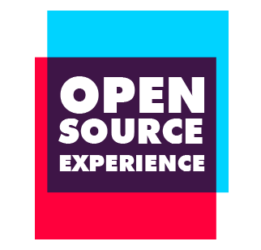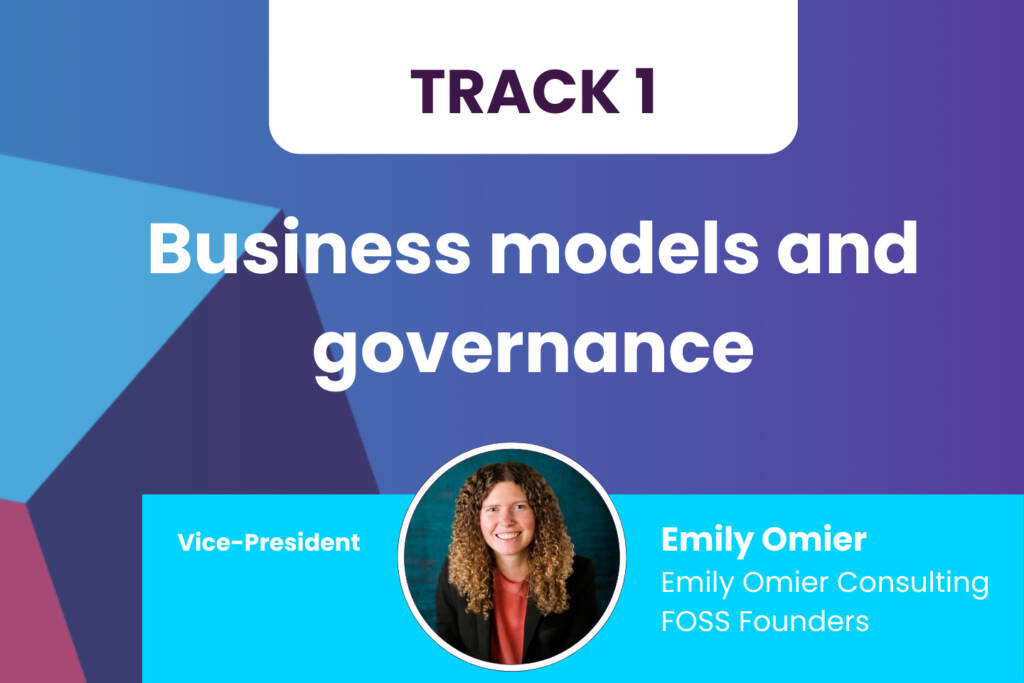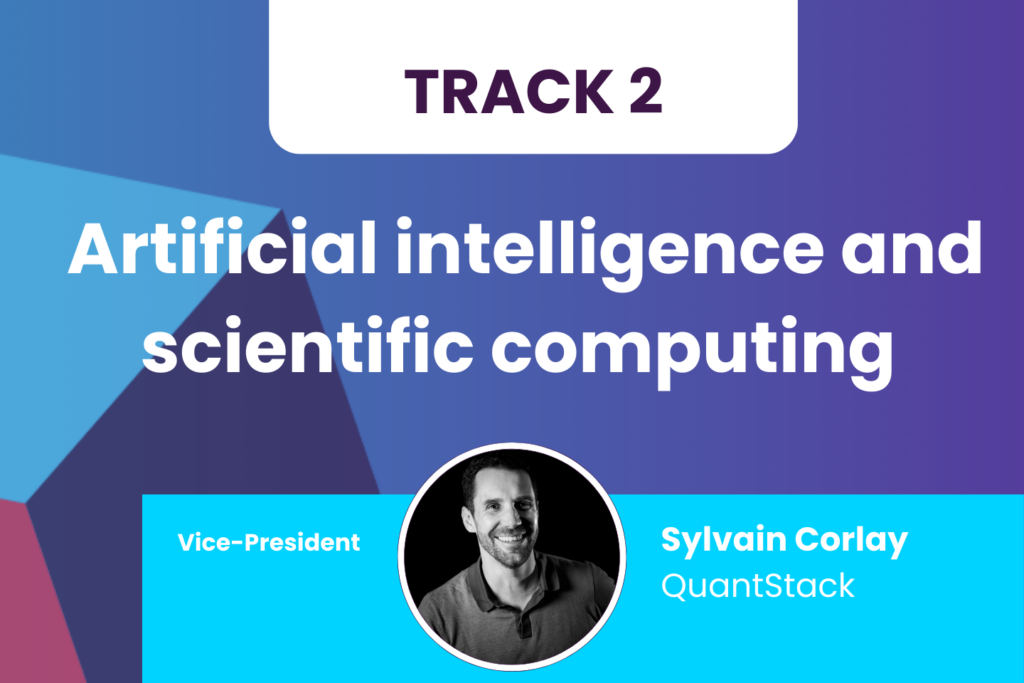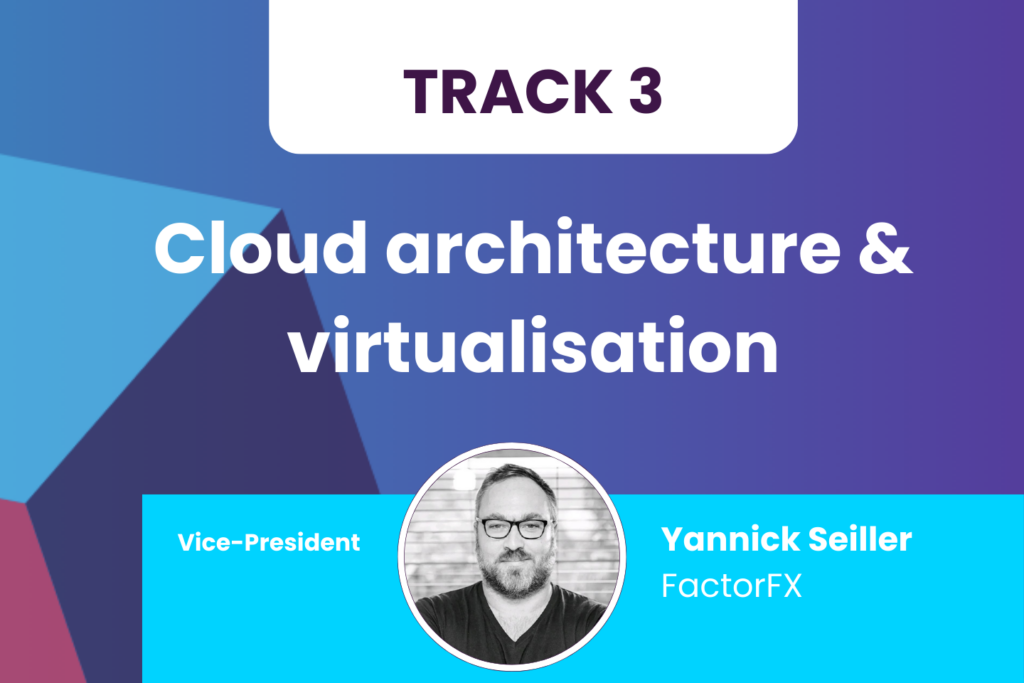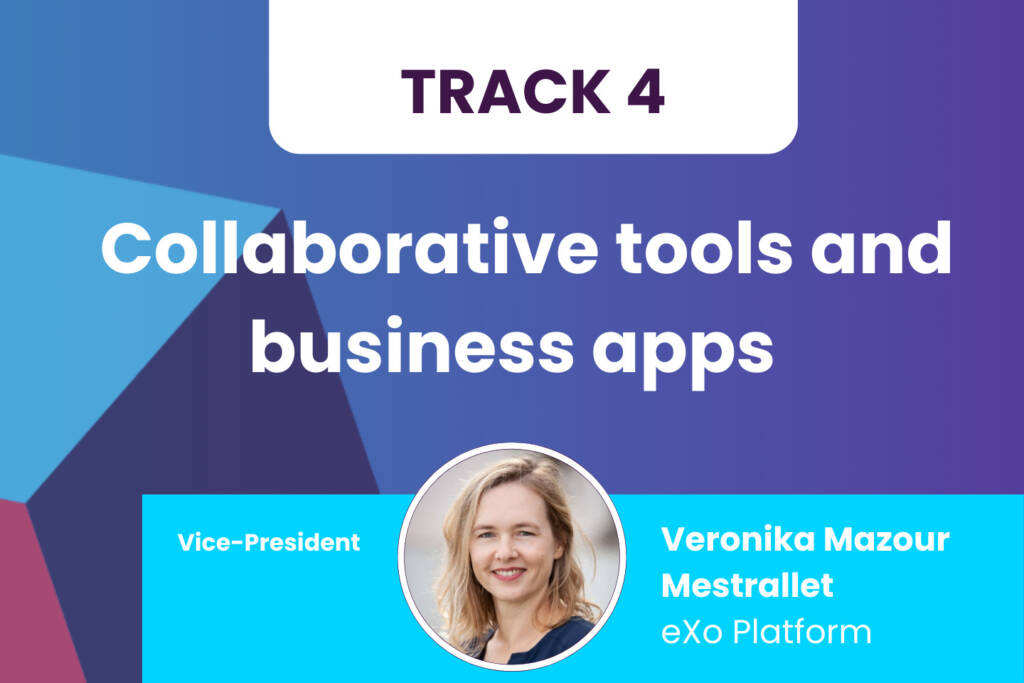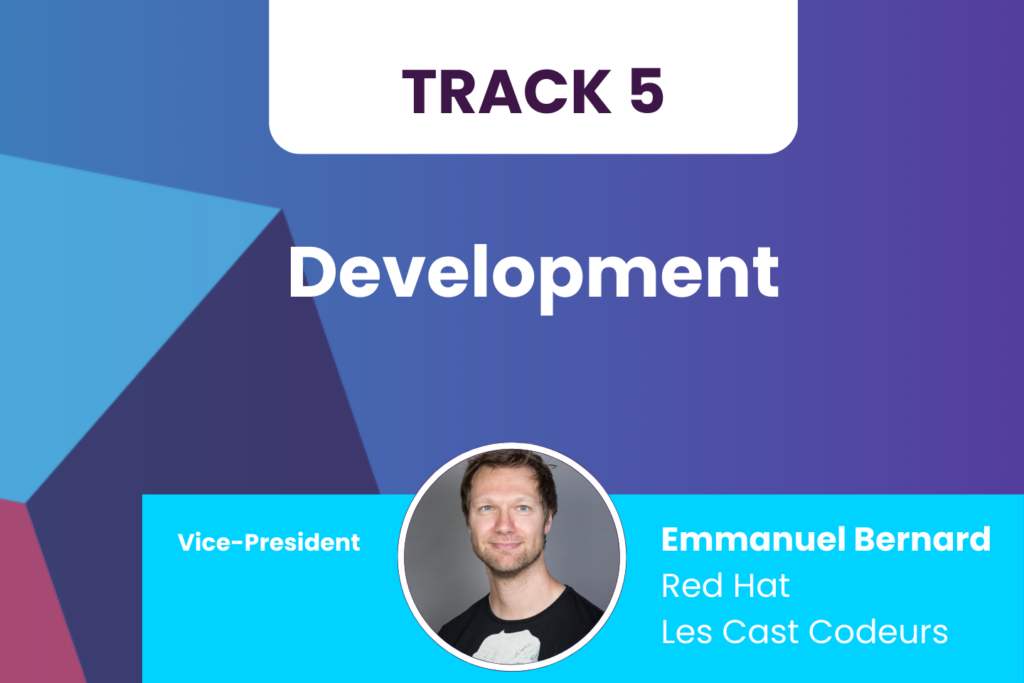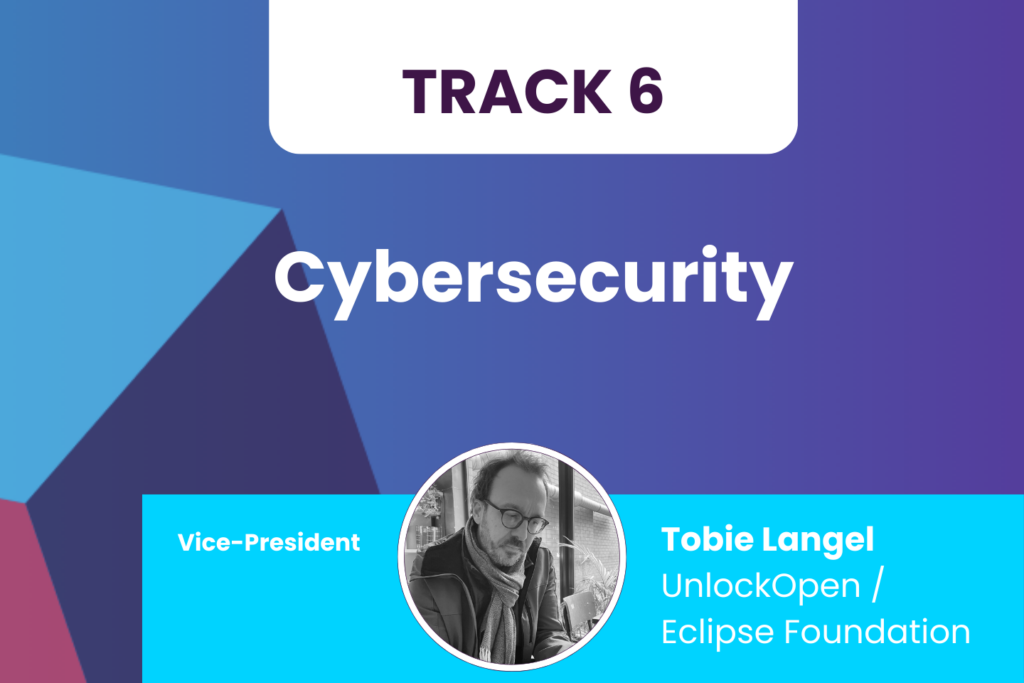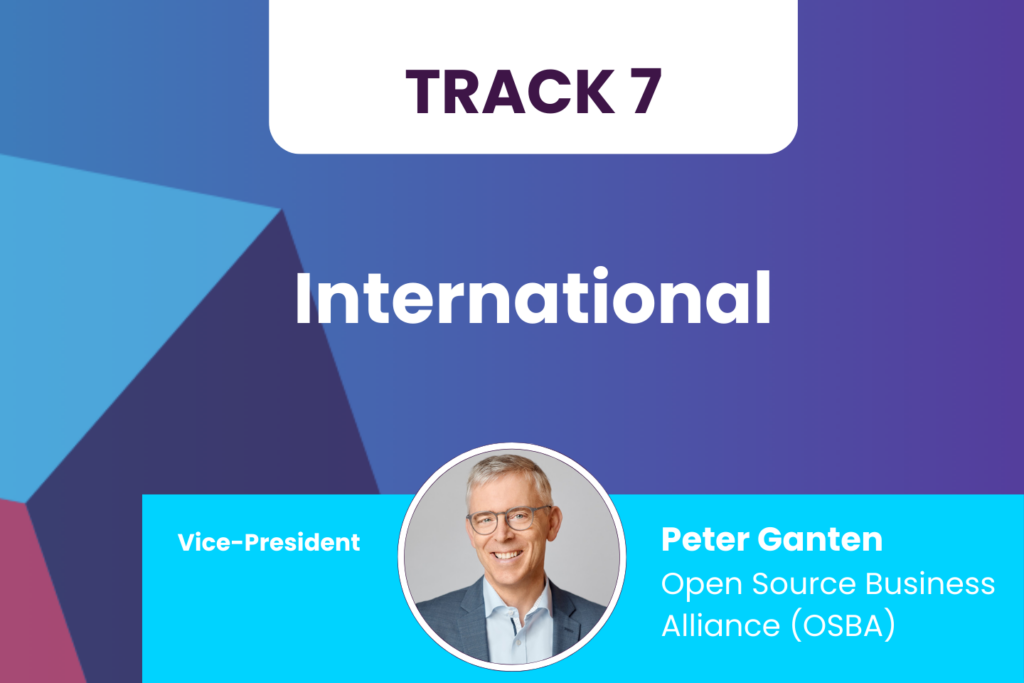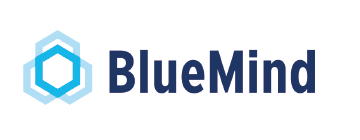THEMES 2025
‘Open Source, Key to Europe’s Strategic Autonomy’
This is the new editorial direction proposed by the 2025 Programme Committee. Find out more in the editorial by Ludovic Dubost, Chairman of the Programme Committee.
Discover the 7 associated tracks and the Vice-Presidents who represent them:
- Track 1: Business models and governance for sustainable open source strategies
- Track 2: Artificial intelligence and scientific computing for data analysis
- Track 3: Cloud architecture & virtualisation for an autonomous future
- Track 4: Collaborative tools and business applications: regaining digital autonomy
- Track 5: Development: software innovation in action
- Track 6: Cybersecurity & the software production chain: open source as a foundation of trust
- Track 7: Track International: european open source ready to challenge the status-quo
 Business models and governance for sustainable open source strategies
Business models and governance for sustainable open source strategies
Led by Emily Omier (Emily Omier Consulting / FOSS Founders), this track explores the sustainable business models, institutional funding opportunities and governance strategies essential to the development of leading Open Source players.
For a successful Open Source publisher, we will examine how to articulate quality Open Source software with a product strategy that enables a successful commercial offering.
In addition, this track will provide companies with an opportunity to present governance structures that encourage the adoption of Open Source internally, in particular through the OSPO (Open Source Program Office).
Presentations are expected on the following topics:
- Feedback from implementing open source business models
- Business models, business/commercial strategies, project financing & maintenance
- Figures, issues, opportunities or threats concerning the open source sector
- General production / contribution strategies
- Governance & OSPO
- Purchasing & contractualization
- Legal & compliance
- Results of studies, viewpoints on issues, discussions on regulations and directives
- Local, national and European public strategies and policies
 Artificial intelligence and scientific computing for data analysis
Artificial intelligence and scientific computing for data analysis
Led by Sylvain Corlay (QuantStack), this track will explore open source solutions in the fields of artificial intelligence and data processing.
Digital autonomy depends on our ability to offer alternatives to the dominant platforms, and the open source movement offers the solid foundations needed to build these alternatives. This track will highlight the open-source solutions and open standards that underpin these alternatives.
Presentations are expected on the following topics:
- Generative AI (LLM)
- Agentic technologies
- Real-life AI implementations Open Source
- Tools, frameworks, libraries, languages
- Integration of AI in Open Source software
- Machine Learning Open Source
- Open Datasets, Models & Licenses
- Data science, Open Source Data Analysis tool
- Computer Vision and Image Recognition
 Cloud architecture & virtualisation for an autonomous future
Cloud architecture & virtualisation for an autonomous future
Moderated by Yannick Seiller (FactorFX), this track explores the open source technologies that are shaping the foundations of IT infrastructures: from cloud and virtualisation to PaaS platforms and DevOps tools.
At a time when dependency on proprietary solutions such as VMWare, AWS, Azure or GCP clouds is becoming critical, this track aims to promote solid, scalable and interoperable open source alternatives that meet the requirements of security, resilience and transparency.
Through feedback, technical demonstrations and case studies, the speakers will share their visions and practices around the open source cloud.
Presentations are expected on the following topics:
- Promoting open source technology bricks as levers of autonomy
- Offering reading keys for building a strategically independent infrastructure
- Demonstrating the maturity and relevance of open source solutions in the face of dominant proprietary offerings
- Virtualization, containerization and orchestration
- PaaS platforms and open source cloud infrastructures
- Infrastructure as Code (IaC), automation and GitOps
- Public, private, hybrid and multi-cloud: what strategies for autonomy?
- Observability, security, compliance: guaranteeing trust in cloud environments
- Open source DevOps tools and mastered CI/CD pipelines
- OS, thin systems, languages and runtime for infrastructure
- IoT, edge computing and embedded platforms: towards a distributed cloud
 Collaborative tools and business applications: regaining digital autonomy
Collaborative tools and business applications: regaining digital autonomy
Veronika Mazour (eXo Platform) will lead this track. Faced with the domination of proprietary collaborative suites or American SaaS services, particularly those from GAFAM, digital autonomy is a strategic priority.
Choosing the right collaborative tools or business application means above all choosing a solution that guarantees data control, interoperability, portability and reversibility.
Feedback, case studies and strategic innovations to reduce dependency on GAFAM solutions and build an autonomous, secure and sustainable collaborative environment.
Presentations are expected on the following topics:
- Digital workplace, intranet, corporate social networking, collaborative suites
- Open-source applications, alternatives.
- Document management, file storage, collaborative wikis
- Messaging (chat, mail) , Office tools
- Videoconferencing solutions
- ERP, CRM, business software
- Feedback from implementing and using one or more open-source alternatives
- Innovative projects, initiatives to build alternatives
- How to migrate / feedback from migrations and change management
 Development: software innovation in action
Development: software innovation in action
Emmanuel Bernard (Red Hat / Les Cast Codeurs) will be leading this track, which will look at open source development practices and technologies that strengthen Digital Autonomy.
We will be showing technical presentations and feedback illustrating how open source bricks in application development stacks can reduce technological dependencies.
A large number of Open Source technologies were born in Europe, and we will be demonstrating the strength of European and French developers and their ability to innovate by proposing tomorrow’s solutions. A robust development ecosystem is essential for our digital autonomy.
Presentations are expected on the following topics:
- Open source frameworks and libraries for application development
- Modular architectures limiting technological lock-in
- Cloud-native development with open technologies
- Agentic applications (using LLMs)
- Migration from proprietary stacks to open source
- Open languages and ecosystems
- Open standards and interoperability
- Integrating open source AI into development
- Feedback on projects contributing to digital autonomy
 Cybersecurity & the software production chain: open source as a foundation of trust
Cybersecurity & the software production chain: open source as a foundation of trust
Led by Tobie Langel (UnlockOpen / Eclipse), this track explores cybersecurity solutions and issues in Open Source. Cybersecurity issues are constantly growing, and the transparency provided by Open Source is a first-rate response to these challenges.
This track will present the solutions available in the field of cybersecurity, on the one hand to improve detection or response to threats, but also solutions incorporating the concept of ‘Security by Design’.
The track will also cover the state of regulation, including the Cyber Resilience Act (CRA), as well as the opportunities and impacts for Open Source players.
Presentations are expected on the following topics:
- Feedback and expertise on open source tools and solutions to strengthen digital security
- Best practices in terms of security and securing open source software
- Cyber-Security applications and open source products
- Network and application security
- Identity, Authentication and Permission Management (IAM)
- Software and the principles of “Security by Design”
- Security in the software production chain
- Testing, software quality, languages and tools
- Privacy protection
- Compliance and regulations (Cyber-Resilience-Act, EUCS, SecNumCloud)
 Track International: european open source ready to challenge the status-quo
Track International: european open source ready to challenge the status-quo
Peter Ganten, President of the OSBA in Germany, member of the APELL board and CEO of Univention GmbH will be in charge of implementing this international track, where conferences in English will be grouped together to showcase European and international innovation in the world of Open Source. This track will be run in collaboration with the European Open Source Business Association APELL.
The internationalisation of the conference is a key objective. In addition to the International Track described above, we are continuing to welcome European exhibitors to the European Village, enabling us to showcase the best of European Open Source at the conference. Open Source Experience is a major event for Open Source in Europe, and many collaborations already exist. Many visitors from all over Europe join us every year, enabling us to showcase French and European expertise globally.
